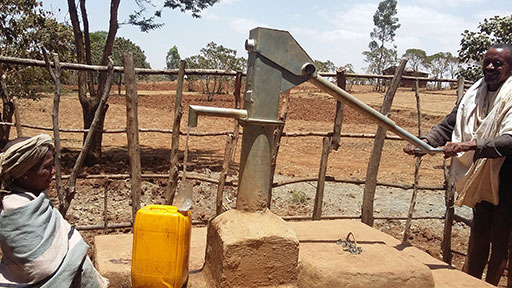3.4.2 Challenge traditional gender roles
Unequal power between women and men is closely linked to their traditional gender roles. The assumption that women cannot be leaders and decision makers must be challenged. Changing people’s beliefs and behaviours is a slow process, but it can be achieved with education and training that raises awareness of gender issues. Case Study 3.2 is a good example of the transformative effect of training in women’s participation in WASH.
Case Study 3.2 AIRWASH project
The objective of the Amhara Integrated Rural Water, Sanitation and Hygiene (AIRWASH) project was to enhance participation of the community, and women in particular, in WASH-related activities. The project was an initiative of the Swiss NGO, HELVETAS.
The novel approach of this project was to train couples together so that husbands and wives gained a better understanding of each other. 26 couples and 3 single women from Meha kebele received training on gender issues and gender mainstreaming. In particular the training focused on the gender division of labour, the burden of water collection on women and girls, and women’s unpaid domestic work. The training was delivered by a combination of structured taught sessions, an exchange visit to a nearby community known to be a model for gender equality, and community discussions.
The project had many positive outcomes including:
- Both men and women changed their perceptions and understood that women can contribute to decision making.
- The women’s self-confidence improved and their sense of ownership of WASH services increased.
- Women got involved in site selection for new water points and worked with the men to set up operation and maintenance systems.
- Three out of the five members of the WASHCO are women; their husbands no longer take over their role on the committee.
- Couples who received the training share the household tasks (Figure 3.3).
- Women participate actively in community meetings and openly express their views. They are no longer just passive receivers of information.
Overall, by training couples together, the project enabled men and women to understand each other’s roles and make changes based on mutual respect within the household.

(Adapted from Mihretu and Gedif, 2016 and Mihretu and Moser, 2017)
3.4.1 Improve WASH services
